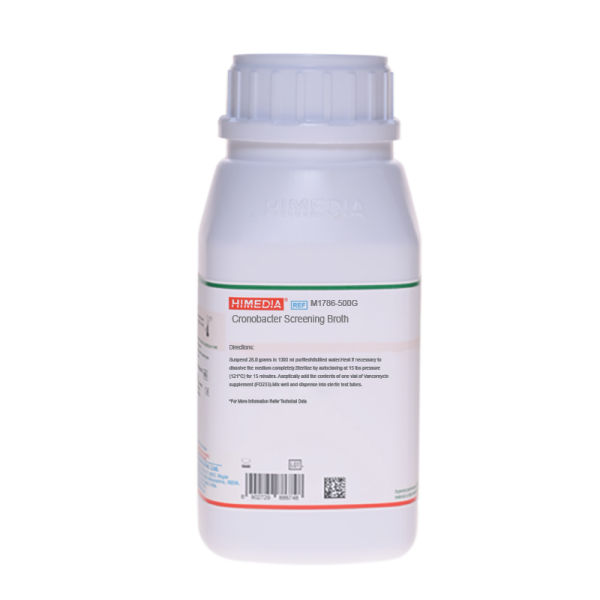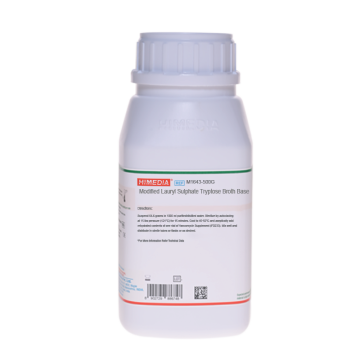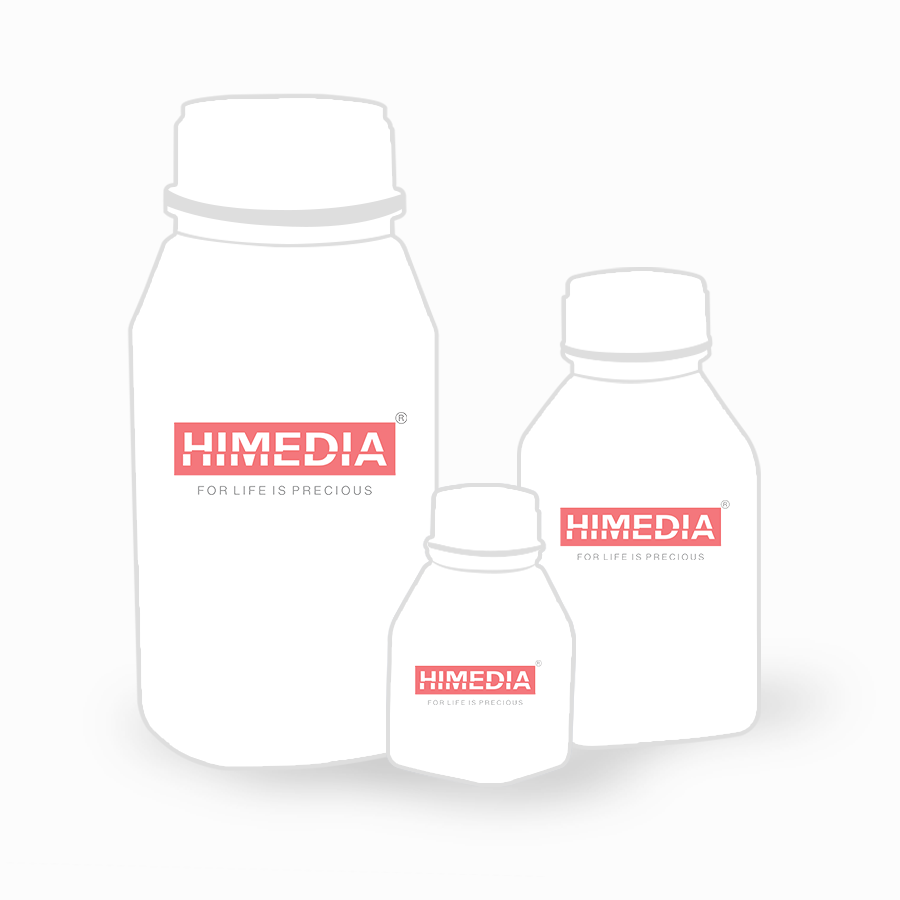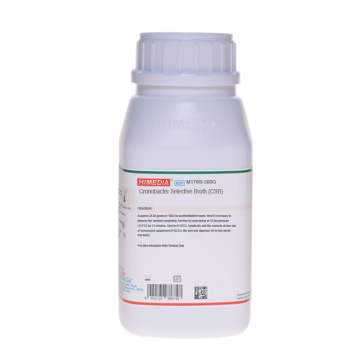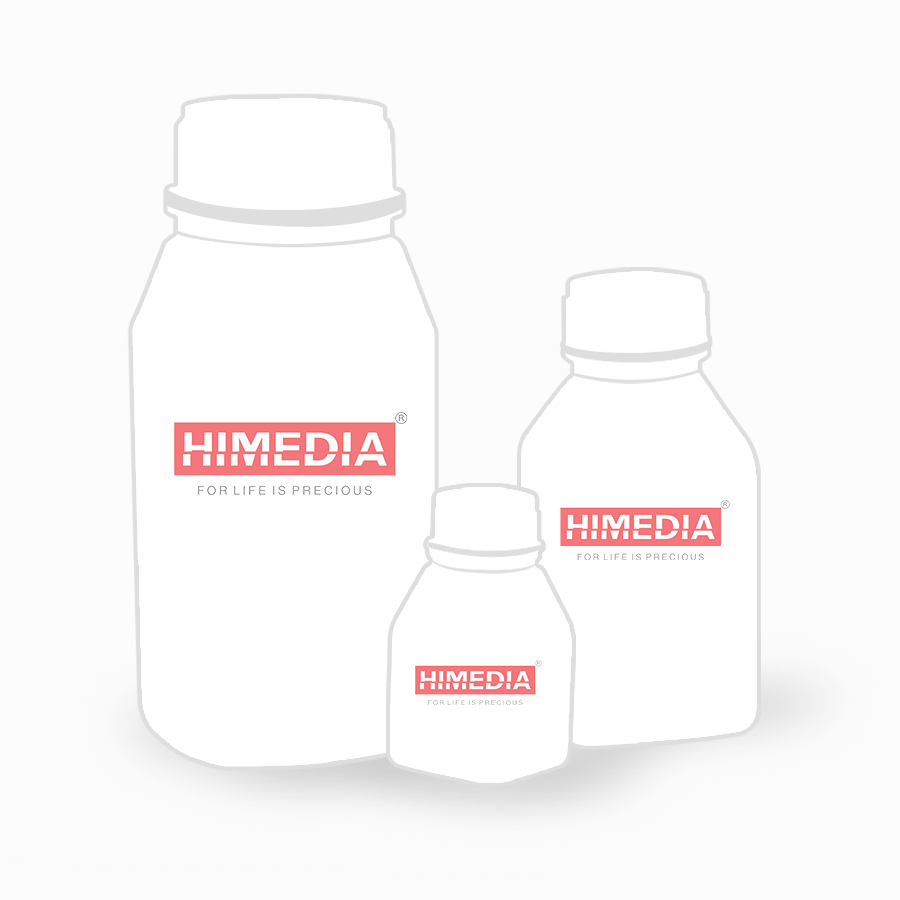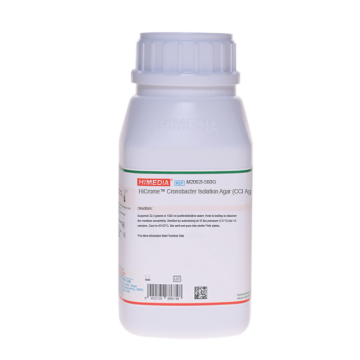 Your enquiry has been submitted
Your enquiry has been submitted
Cronobacter Screening Broth
Intended use
Cronobacter Screening Broth is recommended for screening Cronobacter (formerly Enterobacter sakazakii) from food and environmental samples.
Composition**
| Ingredients | Gms / Litre |
|---|---|
| Peptone | 10.000 |
| HM extract # | 3.000 |
| Sodium chloride | 5.000 |
| Bromocresol purple | 0.004 |
| Sucrose | 10.000 |
Final pH (at 25°C): 7.4±0.2
**Formula adjusted, standardized to suit performance parameters
# Equivalent to Meat extract
Directions
Suspend 28.0 grams in 1000 ml distilled water. Heat if necessary to dissolve the medium completely. Sterilize by autoclaving at 15 lbs pressure (121°C) for 15 minutes. Aseptically add the contents of 1 vial of Vancomycin supplement (FD233). Mix well and dispense into sterile test tubes or flasks as desired.
Principle And Interpretation
Cronobacter (formerly Enterobacter sakazakii) are gram-negative rod-shaped Enterobacteriaceae that have been implicated in outbreaks of disease causing sepsis, meningitis and necrotising enterocolitis(1). Cronobacter species have also been isolated from powdered infant formula as high tolerance to desiccation provides a competitive advantage in dry environments increasing the risk of contamination (2). Cronobacter Screening Broth was specifically designed by Iversen et. al. (3).
Peptone and HM extract provide carbonaceous, nitrogenous compounds, long chain amino acids and other essential nutrients. Sodium chloride maintains osmotic equilibrium. Sucrose present is fermented by Cronobacter. Consequently the broth turns yellow after incubation.
Type of specimen
Food and dairy samples ; Environmental samples
Specimen Collection and Handling
For food and dairy samples, follow appropriate techniques for sample collection and processing as per guidelines (6,7,8). After use, contaminated materials must be sterilized by autoclaving before discarding.
Warning and Precautions
Read the label before opening the container. Wear protective gloves/protective clothing/eye protection/ face protection. Follow good microbiological lab practices while handling specimens and culture. Standard precautions as per established guidelines should be followed while handling specimens. Safety guidelines may be referred in individual safety data sheets
Limitations
- Biochemical test must be carried out for confirmation.
Performance and Evaluation
Performance of the medium is expected when used as per the direction on the label within the expiry period when stored at recommended temperature.
Quality Control
Appearance: Cream to yellow homogeneous free flowing powder
Colour and Clarity of prepared medium: Purple coloured clear solution forms in tubes.
Reaction: Reaction of 2.8% w/v aqueous solution at 25°C. pH : 7.4±0.2
pH: 7.20-7.60
Cultural Response: Cultural characteristics observed with added Vancomycin Supplement (FD233), after an incubation at 35-37°C for 18-24 hours.
| Organism | Inoculum (CFU) | Growth | Colour of medium |
|---|---|---|---|
| Cronobacter sakazakii ATCC 12868 | 50-100 | luxuriant | yellow colour |
| Staphylococcus aureus ATCC 25923 (00034*) | >=10³ | inhibited | - |
| Escherichia coli ATCC 25922 (00013*) | 50-100 | luxuriant | purple colour |
| Enterococcus faecalis ATCC 29212 (00087*) | >=10³ | inhibited | - |
Key : *Corresponding WDCM numbers.
Storage and Shelf Life
Store between 10-30°C in a tightly closed container and the prepared medium at 2-8°C. Use before expiry date on the label. On opening, product should be properly stored dry, after tightly capping the bottle inorder to prevent lump formation due to the hygroscopic nature of the product. Improper storage of the product may lead to lump formation. Store in dry ventilated area protected from extremes of temperature and sources of ignition Seal the container tightly after use. Use before expiry date on the label.
Product performance is best if used within stated expiry period.
Disposal
User must ensure safe disposal by autoclaving and/or incineration of used or unusable preparations of this product. Follow established laboratory procedures in disposing of infectious materials and material that comes into contact with clinical sample must be decontaminated and disposed of in accordance with current laboratory techniques (4,5).
Reference
- Mullane et al. 2007. Minerva Pediatr. 59.137-148.
- Lai.2001.Medicine.80.113-122.
- Iversen et al.2008.Appl.Environ.Microbiol.74, 2550-2552.
- Isenberg, H.D. Clinical Microbiology Procedures Handbook. 2nd Edition.
- Jorgensen,J.H., Pfaller , M.A., Carroll, K.C., Funke, G., Landry, M.L., Richter, S.S and Warnock., D.W. (2015) Manual of Clinical Microbiology, 11th Edition. Vol. 1.
- American Public Health Association, Standard Methods for the Examination of Dairy Products, 1978, 14th Ed., Washington D.C.
- Salfinger Y., and Tortorello M.L. Fifth (Ed.), 2001, Compendium of Methods for the Microbiological Examination of Foods, 5th Ed., American Public Health Association, Washington, D.C.
- Wehr H. M. and Frank J. H., 2004, Standard Methods for the Microbiological Examination of Dairy Products, 17th Ed., APHA Inc., Washington, D.C.
| Product Name | Cronobacter Screening Broth |
|---|---|
| SKU | M1786 |
| Product Type | Regular |
| Physical Form | Powder |
| Origin | Animal |
| Packaging type | HDPE |
| References | 1. Mullane et al. 200 |
| Customized Product Available | No |



